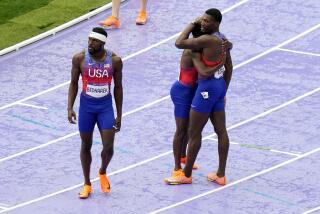U.S. Marathoners Disappoint at Trials
- Share via
If Frank Shorter’s 1972 Olympic gold medal was the high point in the history of American marathoning, Sunday’s U.S. Olympic men’s marathon trials in Pittsburgh may well qualify as rock bottom.
With no runner reaching the Olympic qualifying standard of 2 hours 14 minutes, the United States will send only one runner--trials winner Rod DeHaven of Madison, Wis.--to this year’s Olympic marathon, an all-time American low.
It marks the first time since 1900 that the United States will be represented by fewer than three runners in the Olympic men’s marathon. Additionally, the United States had sent three female marathoners to every Olympics since 1984, when women began running the marathon in the Olympics, but will send only one--trials winner Christine Clark--this year.
Thus, out of a possible six Olympic berths, the United States will send the minimum--two marathoners--to Sydney, Australia.
“We’ve got to get better,” admitted Craig Masback, USA Track and Field’s chief executive officer.
DeHaven, the 10th-place finisher at the 1996 U.S. Olympic 10,000-meter trials, struggled through sweltering conditions to win the race in 2 hours 15 minutes 30 seconds--the slowest winning time at the trials since 1972.
“I’m ecstatic,” DeHaven said, “but in a sad way [because] I’m the only one. It was a race of attrition.”
In addition to the oppressive weather--it was 61 degrees with 84% humidity at the race’s start--the American men were undermined by another factor: A more stringent qualifying standard--2:14, lowered from 2:16--adopted by international track’s governing body, the International Amateur Athletic Federation, late last year.
U.S. record-holder David Morris and Joe LeMay had broken 2:14 in pre-trials events and would have qualified for Sydney had they or another runner bettered 2:14 Sunday. But according to peculiar regulations recommended by the IAAF and adopted by USA Track and Field, if no competitor breaks 2:14 at the trials, only the winner advances to the Summer Games.
Thus, with DeHaven, 33, coming in slower than 2:14, Morris and LeMay, despite having previously eclipsed the qualifying standard, will stay at home. Morris, who set the American record of 2:09:32 at last October’s Chicago Marathon, finished 38th at the trials with a time of 2:29:13. LeMay finished 61st at 2:36:42.
DeHaven, a computer programmer who lessened his work schedule to six hours a day in January to train for the trials, received $40,000 for winning the event and a $35,000 bonus for making the Olympic team.
More to Read
Go beyond the scoreboard
Get the latest on L.A.'s teams in the daily Sports Report newsletter.
You may occasionally receive promotional content from the Los Angeles Times.






